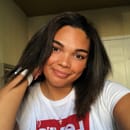Growing up, it was difficult to grasp why people who looked like me were tortured because of a trait about themselves that they were incapable of changing. It was even more difficult to understand why people who had skin a bit lighter than mine were treated with more respect than my brother and I. Elementary school me didn’t ask questions though, I just went on because that was the status quo.
Sixth grade was the first time I was called the “N” word. I remember my mom being so angry, especially because it was an adult who had said it. I knew I was supposed to be angry and upset, and I knew it was a derogatory word, but I didn’t really understand what the word meant. So I went on, letting a grown woman disrespect the skin that I loved.
My first real Black History Month lesson happened in seventh grade. It was my first real one because up until this point teachers had only talked about Martin Luther King and every other peaceful activist, but now we were “mature enough” to hear about slaves being sold, beaten and murdered. I had my head down, reading along with my teacher, but all I could focus on were all of the nervous glances that were now being directed my way by my classmates. They were looking at me like I had been the one snapped by a whip.
The summer between middle school and high school opened my eyes to the assumptions adults made about me when they saw my skin color. We were on summer vacation and my brother and I were each allowed to bring a friend, both of which were white. Our waitress came over once we had finished our meals and asked my brother and me with this pitied look on her face, “Are you two on a separate bill from everyone else?” She had assumed that my white parents and our friends were a family who had graciously brought the misfortunate black children along with them.
In high school, my peers were much quicker to disqualify my “blackness.” Since I was mixed, I wasn’t “actually” black. They always said to me, “You’re the whitest person I know,” or “You’re not even actually black.” Apparently, this meant that it was okay to say the “N” word around me. It amazed me that society took a word that was created as a racial slur and managed to turn it into some sort of greeting.
The night that the Charlotte, North Carolina, riots started, I remember staying up all night watching the news coverage. Fox News showed black and white people both destroying every bit of property in sight, cops attempting to minimize the damage and hold back the crowds. Next, the coverage went back to the studio, a white man and a black man were sitting side by side. “They are doing what these type of people do,” the white man calmly said referring to black people. These people. Did he really just generalize an entire race. My mind did not stop spiraling.
The older I have gotten, the more I have realized that I am always going to live in a world where people expect me to be a certain way because of the color of my skin. I am always going to live in a constant state of fear every time my brother drives somewhere in case an officer may pull him over because society has taught them to fear black men. I am always going to wonder that if one day my kids will still have to experience the same hatred I have. Regardless, I am unapologetically proud of the color of my skin and that will never change.


